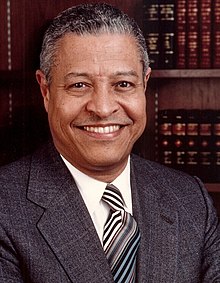Clifton R. Wharton, Jr.
| Clifton Reginald Wharton Jr. | |
|---|---|
 |
|
| 11th United States Deputy Secretary of State | |
|
In office January 27, 1993 – November 8, 1993 |
|
| President | Bill Clinton |
| Preceded by | Lawrence Eagleburger |
| Succeeded by | Strobe Talbott |
| Personal details | |
| Born |
September 13, 1926 Boston, Massachusetts, USA |
Clifton Reginald Wharton Jr. (born September 13, 1926) is an American university president, corporate executive and former United States Deputy Secretary of State In his multiple careers, he has been an African American pioneer.
Born in Boston, his father Clifton Reginald Wharton, Sr. was a 40-year Foreign Service officer and the first African-American to pass the Foreign Service exam and to become a career ambassador. He graduated from Boston Latin School and entered Harvard College at 16. While there, he was National Secretary and a founding member of the U.S. National Students Association. He was the first African American to earn a Master of Arts degree in international affairs from the Paul H. Nitze School of Advanced International Studies of Johns Hopkins University and later graduated from University of Chicago with a master of arts and a Ph.D. in economics.
Reporters and profiles have regularly described Wharton “Such has been the life of Clifton Wharton, whose career in higher education and business, foreign economic development, and philanthropy has included so many firsts – often without much fanfare—that he is sometimes called "the quiet pioneer. In the course of his career, Wharton had become a black member of the establishment rather than a member of the black establishment.
Wharton’s first 22-year philanthropic career began in Latin America with Nelson Rockefeller. Subsequently, he was resident in Southeast Asia from 1958 to 1964 representing a foundation headed by John D. Rockefeller 3rd. During this period he also supervised the foundation’s programs in Thailand, Vietnam, Laos and Cambodia, as well as taught economics at the University of Malaya. Many of his students and grantees became leaders in the region. His research ranged from the supply response of Southeast Asian perennial crops and international trade to the economics of subsistence agriculture and the impact of the Green Revolution. He was a member of the Presidential Mission to Vietnam in 1966 and of the Rockefeller presidential mission to Latin America in 1969. Wharton was the chairman of the Board for International Food and Agricultural Development U.S. AID (1976–83), co-Chairman of the Commission on Security and Economic Assistance, U.S. Department of State (1983), and member of the Presidential Advisory Committee on Trade Policy (1991–92). Wharton has published articles in numerous professional journals and is the author of Subsistence Agriculture and Economic Development (Aldine Press 1969) and co-author with Theodore M. Hesburgh and Paul A. Miller of Patterns for Lifelong Learning (Jossey-Bass 1973). In February 1969 he was elected to the board of Equitable Life, becoming the second black corporate director in the U.S. He later became a director of eight other U.S. corporations.
...
Wikipedia
